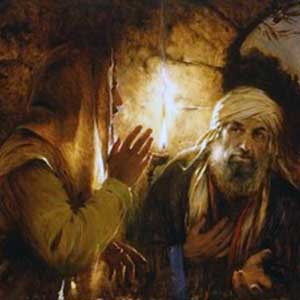
THIS ARTICLE HAS BEEN SUPERSEDED BY A FAR MORE COMPLETE ONE, INCLUDING QUOTATIONS FROM AN EVANGELICAL CHRISTIAN SCHOLAR, CLICK HERE TO READ THE NEW UPDATED PIECE.
Christians sometimes attribute coincidences to “God leading them.” Hereʼs a coincidence I experienced. I had just scanned in an article by Dr. A. J. Mattill Jr. on the questionable historicity of the Gospel of John when compared with the three earlier Gospels, and got into my car and popped in a tape from Dr. Ehrmanʼs course (from the Teaching Company) on “The Historical Jesus,” and the first thing he started speaking about was the Gospel of John, chapter 3, in which Nicodemus comes to Jesus at night and is told by Jesus, “Ye must be born again.‘” That particular tape in Ehrmanʼs course was not even about the Gospel of John, but merely presented a diverting scholarly point about what studying the meanings of words in different languages can teach you. So I was not seeking more info on the Fourth Gospelʼs “born again” chapter, rather this new info just popped out at me, simply by virtue of listening to Ehrmanʼs tapes in order. Only moments before I had added some comments to Mattillʼs paper on that exact subject, the “Ye must be born” chapter 3 dialogue in the Fourth Gospel. So, what an amazing coincidence. If I was still a Christian, I might believe such a coincidence was heavenly providence granting me aid to those who ask intelligent questions concerning the historical veracity of Scripture.
Hereʼs Ehrmanʼs point…
In that chapter of John, Nicodemus says he is puzzled by Jesusʼ statement that “Ye must be born again,” because as Nic asks, “How can a man reenter his motherʼs womb?” The entire conversation in that late Gospel is in Greek, and Nicʼs puzzlement can be attributed to the fact that the Greek word translated as “again” is a word with a double meaning in the Greek language, because it can also mean “again” or “a second time” or “from above.” Dr. Ehrman then points out that the Jews in that day and age spoke Aramaic, not Greek, and in Aramaic the word would NOT have had a double meaning and Nicodemus would not have been puzzled, nor had to ask “how can a man reenter his motherʼs womb.” That raises questions as to the authenticity of that late appearing dialogue. Though a blind faith fundamentalist could “argue” or “prevaricate” or “try to push under the carpet” this valid historical question, and substitute for it his rewriting of the historical concensus concerning the language that people spoke at that time and place, and insist that Jesus and the Jerusalem Pharisee were “both speaking Greek” in that particular conversation, and that it was inerrantly accurate, instead of the whole dialogue being a later creation by a Greek-speaking Gospel author.
As for the Aramaic question, even the majority of inerrantist Christian scholars agree Jesus spoke Aramaic and agree it was the language of the Jews in Palestine in that day and age, including the language of Pharisees, Jesus and his flock.
This leads to the further point of why the first three Gospels, which are all written in Greek, contain so many word for word reproductions even of incidental phrases that connect speeches of Jesus. The reply by scholars is that the evidence lay in favor of the Synoptic Gospels NOT being three independent testimonies, but redactions of one another, starting with one original Gospel in Greek and the later two Synoptic authors copying and editing/redacting the original Greek phrases from the earliest Gospel. For instance, Matthew and Luke reproduce over 90% of Mark; yet they disagree MOST from one another in exactly the right expected places—the places where they could not follow Mark, such as nativity tales and post-resurrection tales.
As Iʼve written elsewhere, the whole idea in the Fourth Gospel about Jesus right from the beginning of his ministry being called the Lamb of God, the Messiah, and initiating hidden teachings “at night” about “ye must be born again,” and initiating mystical sacraments (“ye must be born of water and the spirit to inherit eternal life”) all right from the start of his ministry, is ludicrious when compared with the Synoptics, especially the earliest Synoptic from which the later two were derived that has Jesus even keep quiet about being the Messiah.
Historical scholarship beats C. S. Lewisʼs innane comments about Biblical criticism any day. Lewis admitted no universally applied criteria when studying Scripture such as are recognized by historical scholars. He only acknowledged such criteria in a less than universal fashion whenever it suited his particular theological viewpoint, such as the compromise he made between the Bibleʼs earliest creation myths and that he agreed were myths, but then declared every line of Jesus in the New Testament to be “dominical sayings” that he simply assumed were equally historically truthful and certain in all four Gospels.


The problem was that IAHsha was speaking a northern Galilean Aramaic dialect that Nicodemus did not understand and was confused by. To be born from above was an Aramaic idiom meaning to have a change of mind and life and thoughts and habits. No one determines one's birth whether physical or spiritual. No ceremony like water baptism can affect one's conscience. The washing of the water of the Word through the Spirit is a gift.
ReplyDeleteNo. Because there is no term in Aramaic that means both words. Only in Greek does the word have the double-meaning of born again and born from above. See my more recent post on the topic for a far more complete discussion, and added points made by Ehrman and Strauss: http://edward-t-babinski.blogspot.com/2013/10/did-historical-jesus-speak-about.html
Delete